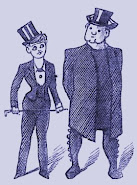by John Adcock
One extraordinary fictional serial of 1848, The Meldrum Family, was written by William Howitt for his own periodical Howitt’s Journal. The complete title is Facts from the Fields – The Depopulating Policy, Extension of the English Manufacturing System by Which Men are Worked up into Malefactors: The Meldrum Family.
A labourer named James Meldrum is driven to the city to seek work,
a victim of the Enclosures Acts, a series of Acts passed between 1750 and 1860,
which enclosed open fields and common land in the country, creating legal
property rights to land that was previously considered common ground. Falling
on hard times, described in excruciating detail by Howitt, Meldrum’s children
become increasingly disobedient to their distracted father. While Meldrum
trudges the country begging for odd jobs to keep food on the table, his sons
quit going to chapel and stay up all night drinking in taverns. The breaking
point is reached when his daughter Dinah joins her rebellious brothers.
She appeared to hold the same notions as her brothers, and to be resolved to “live while she could,” as she called it. Often when James came home at night he found Dinah reading. Sometimes her brothers were in, and she read aloud; but what they read he scarcely knew, for he became so drowsy on entering the house, that he could just but keep his eyes open while he got his supper, and then fell asleep in his chair (…)
But one Sunday he saw a quantity of those cheap publications with which the little book-shops abound, lying about, and he took up first one, and then another, and read. They were stories of the most inflated and extravagant kind, of lords and ladies, and thieves, and people with the most romantic names and startling actions imaginable. Murder, seduction, contempt of everything sacred, crime and dissipation of every possible kind, were dressed up in a fashion which would disgust and shock the refined and the virtuous, but which only stimulated the mind already depressed.
“Varney the Vampyre, or the Feast of Blood;” “The Murder at the Old Ferry;” “The Hangman's Daughter;” “The Illuminated Dagger;” “Prince Morio and the Fair Vatilde;” “Seduction;” “The Love Child;” “The Wife's Tragedy;” “Mantel;” “The Ordeal by Touch;” “The Rivals, or the Spectre of the Hall;” “The Old House of West Street,” etc. etc., and numbers of the like relations, all illustrated by engravings of the most atrocious character, were the staples of this literature which poured in myriads of sheets on the devoted heads of the poor and ignorant.
To these were
added cheap reprints of infidel writers, in which religion was represented as a
mere state invention to feed priests, and frighten people into submission.
There were halfpenny “murder sheets,” detailing all the most revolting murders
as they every week occurred, and every species of vileness, villainy, and
horror, in pennyworths and halfpennyworths.
“What was the
effect on the mind of Meldrum?” asks Howitt.
For a moment, he appeared surprised; then stunned;
then he took up another and another, and a new and wild appetite seemed to
seize on him. Strange and dark thoughts had passed through the mind of James
Meldrum as he plodded along the road to and from his labour in wind, and rain,
and darkness. Strange and dark thoughts, darker than the night, wilder than the
wind, more chilling than the rain, not only passed through his mind, but
remained in it, and brooded there like evil spirits that had found a roomy and
congenial home.[i]
Meldrum, losing his faith in a benevolent God, rushes out to walk the night country in the drenching rain and thunder, mind racing with horror. “From this day Meldrum was another man,” a mere work of chance in an indifferent universe, and he spent his non-working hours drinking gin, avoiding chapel, and reading “the fatal literature.” Eventually he becomes a madman, a murderer, and a homeless wanderer, rejected by his own children and his community.
The devouring of penny bloods did not cause Meldrum’s madness;
it was the catalyst that opened his mind to madness. The source of his insanity
was industrial London’s debilitating depopulation policies.













I’d love to see examples of these stories!
ReplyDelete